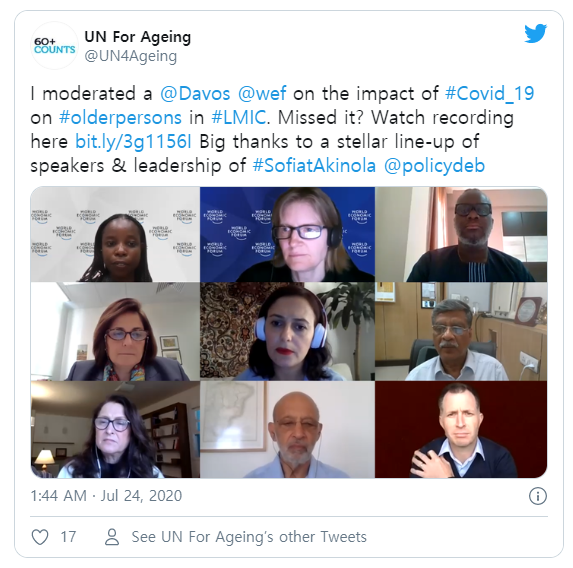COVID and Ageing Society Dialogues: Impact on Older Adults in Low-and-Middle Income Countries
The World Economic Forum's Global Future Council on Longevity, in collaboration with AARP and the National Academy of Medicine, is in the midst of a five-part dialogue series about COVID-19 and ageing societies. Five webinars during June and July are bringing together experts from government, academia, civil society, foundations and the private sector to consider key issues faced by older adults, while highlighting opportunities for action on ageing and health.
COVID-19 and Ageing Society: Part Four
South and Central America are now the new epicentre of the global coronavirus pandemic as cases continues to rise sharply, contributing to record numbers of new infections registered globally. Cases are also on the rise across Africa with experts now warning of the continent becoming the next epicentre of the outbreak. Fragile healthcare systems in many low- and middle-income countries could be overwhelmed in the face of a severe COVID-19 outbreak. The vulnerabilities of older adults may be particularly pronounced in these settings challenged by weak health systems, poor infrastructure and the specter of severe longer-term socio-economic effects of the crisis.

Abla Sibai, Professor and Chair of the Epidemiology and Population Health Department, American University of Beirut, co-Founder of the AUB University for Seniors Program and the founding Director of the “Center for Studies on Aging” in Lebanon
Ademola Olajide, Country Representative, Kenya, UNFPA
A B Dey, Professor and Head, Department of Geriatric Medicine, Former Dean (Research) Nodal Officer, National Center for Ageing, All India Institute of Medical Sciences, New Delhi
Laura Machado, CEO of InterAGE Consultoria em Gerontologia
Justin Derbyshire, Chief Executive Officer, HelpAge International
Anupam Sibal, President, Global Association of Physicians of Indian Origin (GAPIO, Group Medical Director, Apollo Hospitals Group, India
With special contributions from:
Isabella Aboderin, Professor of Gerontology, Pervioli Chair in Africa Research and Partnerships, School for Policy Studies, University of Bristol
Joy Phumaphi, Co-Chair, UN Secretary-General Independent Accountability Panel for Every Woman, Every Child, Every Adolescent; Executive Secretary, African Leaders Malaria Alliance (ALMA)
